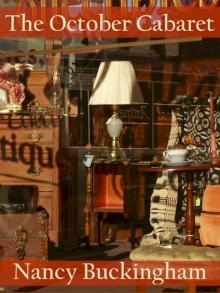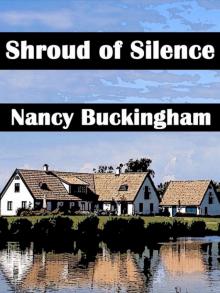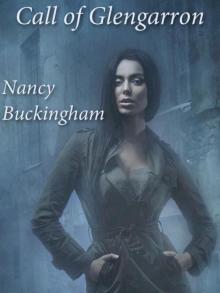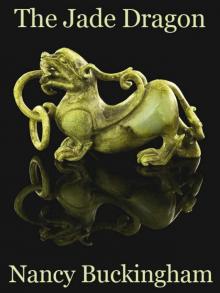- Home
- Nancy Buckingham
Valley of the Ravens Page 3
Valley of the Ravens Read online
Page 3
“You needn’t worry, dear,” I assured her with a smile. “I shall not repeat anything you’ve told me. Truly I won’t!”
A few minutes later I made my way along the corridor to Nadine’s room, and tapped on the door. “Come in.”
As I entered, I was picturing the Nadine I remembered. She had been a striking beauty, it was agreed by everyone—slender and graceful, with classical features, a petal-like complexion, and glorious coppery-red hair.
The spacious room, the grandest bedchamber in the house, had been refurbished since I’d last seen it. Rose-colored damask now hung on the walls, with curtains of a deeper shade. The big four-poster was gone. In its place stood a modern bed with a counterpane of richly embroidered silk. And silk covered the floor, too, in the form of exquisite Chinese rugs. The windows, which commanded the length of the valley, were open to the warm August twilight, but in the grate a fire burned. Nadine reclined on a sofa drawn up before it. She was studying her coiffure in a hand mirror, while a maid stood behind her holding a second looking glass.
Jerome’s wife was still as beautiful as she had ever been. Indeed, there was an ethereal frailty about her now which seemed to enhance her loveliness. Her high-boned cheeks were very pale, the skin almost transparent.
Nadine dismissed the maid with a flick of her hand.
“Sarah, is that you? Do come over here to the light where I can see you properly. I have been so looking—”
She stopped abruptly as I came forward, catching her breath. In her lustrous green-gold eyes there was an expression of incredulity. Her hand fluttered to her lips and hovered there, a tiny lace handkerchief clutched limply in her fingers.
“What is it, Nadine?” I asked, concerned for her.
She took a few deep, slow breaths, and seemed to recover a little. “This silly heart of mine—it isn’t up to shocks. You see, just for a moment I thought ... Well, you are so astonishingly like your sister. Oh dear, I’m afraid I must sound very foolish.”
“I’m sorry to have taken you by surprise, Nadine. Until I arrived here I had not realized I bore any close resemblance to Felicity. But everyone has been remarking upon it.”
Nadine gave a wan smile. “Clearly none of us has allowed for the passage of time. But enough of that, come and kiss me, Sarah. Sit down—there, at the foot of my sofa. Was it a very wearisome journey?”
I shook my head. “It passed very quickly, because I was so looking forward to being at Farracombe again. I have been taking great breaths of the exhilarating Exmoor air, and remembering ...”
“Remembering?”
“I meant the pleasant things,” I explained. “I had a very happy childhood here, Nadine.”
“Yes, I know.” There was a little pause. “We were all of us saddened by the news of your father’s death, Sarah.”
“All of you?” I said quickly, then wished I hadn’t.
Nadine gave me a look of faint reproof. “You mean my father-in-law? But he is an old man now, Sarah— and these days his arthritis renders him almost as helpless a cripple as I am. What’s past is past and done with.”
“But is it past for him, I wonder? When I arrived just now, Uncle Joshua was sitting by his window. He looked directly at me, Nadine, but he gave no sign of recognition. He just stared.”
She arched her eyebrows in exasperation. “The old man spends hours each day at that window of his, watching every coming and going like a hawk. If a servant is sent out on an errand, he demands to know all about it.” She leaned forward and impulsively took my hand. “You mustn’t let him upset you, Sarah. Joshua Lefevre’s days of power are over. It is a different regime at Farracombe now, with Jerome running everything. The old feuds, the old quarrels are forgotten. You too must put them behind you.”
I smiled my gratitude, thinking how bravely Nadine had adjusted to the restricted life she was forced to lead.
“Nadine, I knew nothing of your accident until Jerome told me—we met for a few minutes on the road. I can’t tell you how shocked and distressed I was.”
“Thank you, Sarah dear. It happened so long ago that I have grown accustomed to it now. After all, there is nothing I nor anyone else can do to alter things. If only Jerome could accept the situation as I do. But the poor darling insists on blaming himself.”
“Jerome was responsible for your accident?” I said, taken by surprise.
“No, no, he cannot be considered in any way to blame. He and I were out riding together, and suddenly, for no accountable reason, my horse suddenly decided to bolt. It happened entirely without warning, so what could Jerome have done? The accident was nobody’s fault, but we have both of us had to pay grievously for what occurred that day. You see, Sarah—it wasn’t only the use of my legs that I lost. Although I was unaware of it at the time, I was carrying a child. And now, of course, there can be no question of my ever having another.”
I didn’t know what to say. “I am so very sorry, Nadine.”
Now I understood Jerome’s abrupt change of manner in the carriage when he had spoken of his wife’s accident. It was clear that the incident weighed heavily and bitterly upon his mind. He could not forgive himself for having been helpless to prevent such a tragedy.
A small white Pekingese dog, which had been curled up asleep on a cushion before the fire, suddenly yawned and stretched. Nadine clicked her fingers and patted the sofa. “Here, Foo-foo.” The dog jumped up obediently, and Nadine fondled its soft silky ears. “Dear little Foo-foo was a present from Jerome. He’s so thoughtful and considerate. He is always trying to think of new ways of making my life less tedious.”
“She’s a sweet little thing, Nadine. You must be very fond of her.”
“To a fault, I’m afraid. Oscar teases me unmercifully. He says I’m quite dotty about her.”
I smiled. “How is your brother, Nadine?”
“Oh, Oscar never changes. He has gone to London for a week or two, where I am sure he is finding plenty to amuse him.”
“He is not yet married, then?”
Her brow creased in a tiny frown, and I guessed that her brother’s frivolous behavior caused Nadine more than a little worry.
“I sometimes fear that Oscar will never find the woman to suit him. I am only thankful that my father-in-law was able to give him a position on the estate. At least it helps to keep him out of mischief.” She paused, lifting the little dog and holding it lovingly to her breast. “We shall have to think of some young company for you in this house of invalids, Sarah.”
“There is Ginny,” I reminded her. “She struck me as being very lonely. I hope we can become close again, the way we used to be.”
Nadine gave a long sigh. “Ginny is a difficult child, Sarah. She has strange moods and a vivid imagination—far too vivid for her own good.”
“Perhaps because she has been so much alone,” I suggested. “We used to have such good times together—Ginny, Felicity, and I. Now that I am back, she will have someone nearer her own age to talk to. Miss Fincham must be quite old by now.”
“Miss Fincham? Oh, that quaint old soul left us long ago. She got altogether past it, I’m afraid. Jerome gave her a generous pension, and she went to live with a cousin of hers somewhere in Sussex. We decided not to replace her. It seemed unnecessary to keep a resident tutor just for Ginny.”
I could not conceal my surprise—and disappointment, too. This was yet another change at Farracombe that I had not anticipated.
“Poor old Finchy. She always used to say how she hated her cousin’s bossy ways when she spent holidays with her.”
Nadine shrugged her shoulders. “I expect she was only too thankful to have somewhere to go.”
I felt a lump in my throat as I thought of little Miss Fincham, who had been at Farracombe from the day a governess had first been needed for Felicity. In due course she had taken me under her wing, and later Ginny too. Despite her timidity and lack of confidence with other adults, Alice Fincham had been an excellent teacher, and we were very fond of
her. She loved her work at Farracombe, and I remembered her once confiding to Felicity and me that she dreaded the day when she would eventually have to retire.
I resolved to write to her, and perhaps send a small gift as a memento.
When I left Nadine’s room a few minutes later Ginny was hovering in the corridor outside, waiting for me.
“Nadine mentioned that Finchy has gone,” I said, as we made our way downstairs. “Who gives you your lessons nowadays?”
“Mr. Smallbridge, the curate. He comes up from the parsonage three times a week, in the mornings. And he sets me work to do on my own the days he doesn’t come.”
“I see. Do you like this arrangement, Ginny?” Her face clouded. “I hate it. Mr. Smallbridge makes lessons so dull and boring. It was different with Finchy. We used to sit and talk for hours and hours up in the Long Gallery, and she told me all sorts of interesting stories about when she was a girl, and about her brother Gordon who got killed at the siege of Sevastopol. After you had gone away, Finchy seemed the only friend I had left, Sarah.” She hesitated, then added in a breathless rush of words, “Do you think that’s why they made Jerome send her away?”
“I don’t understand you. Who are ‘they’?”
“The ravens, of course.”
“Ginny!” I exclaimed. “What do you mean?”
But again she seemed to have withdrawn into herself. In silence we crossed the hall and went through to the small dining room where the family had meals when there were no guests. Thirza was standing by the fireplace with her back to us. As she turned, I saw her hastily slide a wineglass onto the marble mantelshelf.
“Oh, there you are, my dears. I was just—” She sounded flustered, as if we had caught her out in something slightly reprehensible. “Er ... Nadine and Jerome will be joining us in a moment.”
“And Uncle Joshua?” I inquired.
“Oh no, not Mr. Lefevre. He rarely comes down to dinner these days, unless it is a special occasion.”
So my homecoming, after five years’ absence, was not a special occasion.
I felt rather relieved, however, that I was not required to meet Uncle Joshua this evening. The thought of coming face to face with him filled me with vague alarm, and the longer it could be postponed the better. I feared that I would be unable to hide my resentment at the way he had treated my father.
I heard footsteps outside, then a manservant threw open the paneled double doors and Jerome entered the room carrying Nadine, the silken folds of her blue-and-ivory gown sweeping almost to the floor. There was a look of triumph in the radiant smile she gave us, and I had to acknowledge that it made a dramatic entrance, being borne tenderly to dinner in one’s husband’s arms. But I did not blame Nadine for enjoying one of the few compensations of her invalid life.
Jerome set her down with gentle care in the gilded chair at one end of the table, and the rest of us took our places.
I enjoyed eating Batsy Tassell’s good Devonshire cooking again - a chilled soup, grilled local trout, roast forequarter of Exmoor lamb, and apple tart with thick clotted cream. Yet the atmosphere throughout this delectable meal was somehow uneasy. I felt aware of undercurrents I could not fathom. Only Nadine and I, it seemed, were ready to make any effort at conversation. Jerome was strangely silent and, judging from his expression, his thoughts were far from happy, while Ginny still remained withdrawn. Thirza darted anxious, birdlike glances from one to the other of us, as though she were in some way afraid.
Immediately after we had finished coffee Nadine retired upstairs, Jerome once again bearing her in his arms. I waited a short while, then made my excuses and went to bed. It was true that I was tired from my long journey, but more than that I felt the need to be alone.
I wanted to think over all the puzzling things that had happened since my arrival, to examine the curious atmosphere of tension I had sensed, and to consider how best I might adjust to my new life at Farracombe Court.
* * *
Chapter 3
Next morning I felt at loose ends. Everyone else at Farracombe had their established routine, but as yet I had no part in the life of the household.
I had seen nothing of Jerome. He always rose early, I gathered, and breakfasted alone before going off to work at the estate offices in the stable block. Thirza had eaten with Ginny and me, but immediately afterward she excused herself to go and attend to Nadine.
“Mr. Smallbridge will be here soon,” Ginny told me with a little sigh. “I wish he weren’t coming this morning, then I could show you my pony. He’s called Bimbo.”
The curate turned out to be a pale young man with a flabby handshake.
“How—how do you do, Miss Haddow? A pleasure. I—I have heard so much about you.”
“What have you heard about me, Mr. Smallbridge?” I inquired.
This brought a rush of color to his pallid cheeks. “Why only—I mean, Miss Ginny was so excited when she knew you were coming, and spoke of you to me. That is all, I do assure you.”
Plus, I felt sure from his manner, the gossip of the entire neighborhood. I wanted to ask him exactly what he had been told, but I guessed such a question would reduce him to agonies of embarrassment.
Left to my own devices I wandered through the house, finding constant reminders of the past, both happy and sad. Eventually my footsteps led me to the Long Gallery up on the top floor, a favorite haunt of my childhood. This ran the entire width of the house, a hundred and seventy feet, it was said, and had alcoves leading off it which were fitted with padded window seats.
It was just for such gray, foggy days as today that the Long Gallery had been designed when Farracombe Court was built in Elizabethan times. For generations, the household had foregathered here to take recreation and exercise when it was too inclement to be out of doors. I remembered the shuttlecock and ninepins I had played here with my sister Ginny and our friends, the wild games of tag, the hoop races.
But today there was only me, and the silence, and the mist curling down from the moor ...
I heard footsteps on the stairs. A man’s voice called up, “Miss Sarah, are you there?”
“Yes, here I am.”
A minute later he appeared in the archway, a tall, lanky man with narrow shoulders and more hair on his cheeks than on the top of his head. Rudd, who was Uncle Joshua’s valet and personal servant. To my belief he had never smiled in his entire life, and I thought he looked even more lugubrious than when I saw him last.
“I’ve been looking for you everywhere, Miss Sarah,” he began in an aggrieved tone. “None of the other servants knew where you’d got to.”
“I’m sorry, Rudd,” I said mildly. Then feeling that our meeting called for some sort of personal remark, I asked him how he was keeping.
“I’m well enough,” he said shortly. “The master wants to see you.”
“Do you mean Uncle Joshua?” I queried, remembering Thomas Tassell in the carriage yesterday.
“That’s what I said, miss—the master!”
My heart sank. The moment had come.
“Please tell him that I will be there in about ten minutes.”
“He said now, miss. And already I’ve been a quarter of an hour searching for you. He won’t be none too pleased.”
I hesitated, feeling I should refuse to be browbeaten. Being anxious to look my best when I saw Uncle Joshua, I had intended going first to my own room. But I decided no purpose would be served by seeming willful.
“Very well then,” I agreed, and followed Rudd down the upper stairway. Outside the door he motioned me to wait and slipped inside. At once I heard Uncle Joshua’s voice, raised in temper.
“Damn your eyes, Rudd! Where the devil have you been all this time?”
Rudd’s reply was a low, obsequious mumble, inaudible to me.
“Well, bring the girl in then!” shouted Uncle Joshua. “I can’t talk to her out on the landing.”
The door opened again and the manservant beckoned me inside. His face was a mask, a
nd it was impossible to judge whether he minded being bellowed at in my hearing. But I minded. Also, I objected to being referred to as “the girl.” I went into Uncle Joshua’s room with heart beating fast, but my head was held high and my tread was firm.
The first thing I noticed was a rank odor of stale tobacco smoke. This had formerly been one of the principal guest bedrooms, but was now furnished as a gentleman’s sitting room, with pieces I recognized from elsewhere in the house, a Sheraton writing table from the library, a large revolving globe, a tall clock in an inlaid rosewood case, a glass-fronted display cabinet containing the best pieces from my uncle’s collection of antique silverware, and several oil paintings of wild moorland scenes.
Uncle Joshua sat in a wing armchair drawn up to the window, from which I knew he commanded a view of the courtyard. Although the rest of the room was neat and orderly, a small area around his chair was strewn with books and newspapers, as if thrown down impatiently within the last few minutes. Rudd hurriedly knelt and started to clear them up.
“Come here where I can see you properly, girl,” Uncle Joshua ordered. Then, as I moved forward, he exclaimed, “Good God, they’re right! You’re exactly like that damned sister of yours. All I can say is, I hope you don’t turn out to resemble her in character, too. Rudd, what do you think you’re doing, crawling around on the floor? Get up, you fool, and clear out. I’ll ring when I want to see your miserable face again.”
As the door closed behind the servant, Uncle Joshua turned his fierce blue-eyed stare full upon me. “Well, girl?”
“My name is Sarah,” I replied steadily, “and I should like to sit down if you please, Uncle Joshua.” He looked taken aback by my effrontery. “Oh, very well,” he said grudgingly. “Pull that chair around, Sarah—I can’t do it for you.”
When I was seated, I began, “I am sorry to find you in such poor health, Uncle.”
“Sorry be damned,” he spat. “You don’t care! Nobody does! Oh, I suppose my daughter-in-law understands, being in much the same boat herself. But as for the rest...” He slapped the arm of his chair with his open palm, then winced with the pain of it. “My son seems to think I don’t count anymore. He runs the estate without bothering to consult me. God knows what sort of a mess it’s in.”

 The Other Cathy
The Other Cathy Design for Murder
Design for Murder Valley of the Ravens
Valley of the Ravens The October Cabaret
The October Cabaret Model Murder
Model Murder Murder in the Cotswolds
Murder in the Cotswolds Deadly Deceit
Deadly Deceit Return to Vienna
Return to Vienna Shroud of Silence
Shroud of Silence The Silver Castle
The Silver Castle A Cotswolds Legacy
A Cotswolds Legacy Marianna
Marianna Cold Coffin
Cold Coffin Kiss of Hot Sun
Kiss of Hot Sun Call of Glengarron
Call of Glengarron Quest for Alexis
Quest for Alexis The Jade Dragon
The Jade Dragon